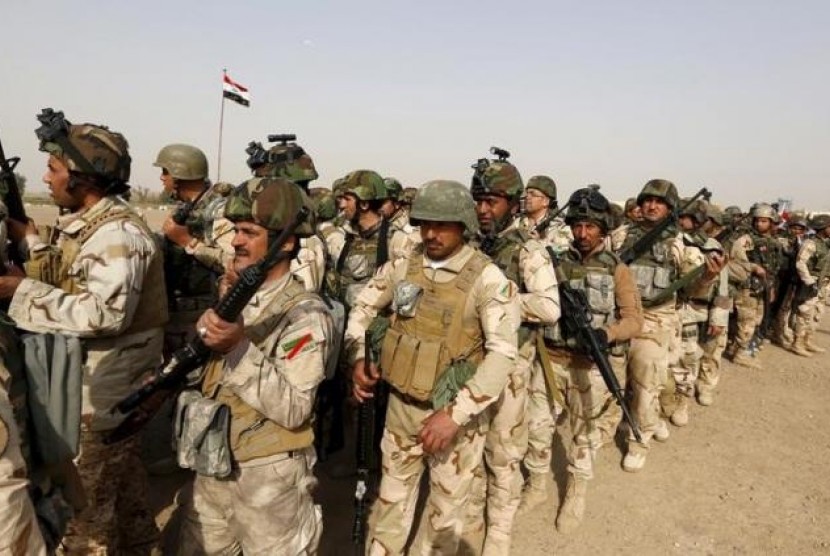REPUBLIKA.CO.ID, BAGHDAD -- Iraq's fragile political reform reached a deadlock after thousands of followers of prominent Shiite cleric Moqtada al-Sadr broke into the heavily fortified Green Zone.
Observers said it threatens to deepen the division among the political factions, at the time when the country is fighting the Islamic State (IS) militant group which seizes swathes of territories in northern and western regions.
Since September 2014 when Iraqi Prime Minister Haider al-Abadi came into power, he pledged to carry out reforms to ease sectarian tensions and stamp out corruption.
However, the powerful political parties, including his own Islamic Dawa Party, made it hard for him to break their influence, observers said.
According to the Iraqi constitution, the country's political process was built on power-sharing system, also known as quota system, with the aim of allowing all Iraqi ethnic and sectarian factions to take part in the decision-making process.
"The power-sharing system was seen as a compromise to the deeply divided Iraqi sectarian and ethnic factions, who suffer from lack of trust after the U.S.-led invasion in 2003," said Ibrahim al-Ameri a lecturer of politics in a Baghdad college.
However, the power-sharing system, which also includes sharing cabinet seats, has long been criticized for prompting unqualified candidates and encouraging corruption.
"After 13 years of the U.S.-led invasion, the political parties have turned to be organizations that serve their own interests, while they were supposed to represent their ethnic and sectarian factions and minorities," Ameri said.
"Abadi's most difficult task is that none of those political parties is willing to easily lose its gains. Abadi cannot confront those parties, let alone, his own Islamic Dawa Party," he said.
Moqtada al-Sadr, who initially cast himself as Abadi's ally, is now pushing for more radical changes in Abadi's cabinet.
"The next few weeks could be crucial. There would be grave consequences if Sadr insists on pursuing his ambitions to make comprehensive changes to Abadi's cabinet and to curb the influence and dominance of political parties on the country's public institutions," Ameri warned.
"Sadr threatens to use the power of his followers to achieve the government reshuffle, which could result in significant bloodshed from both his followers and government forces. Moreover, it could cause collapse of Iraq's current political process," Ameri said.
On Saturday afternoon, thousands of Sadr's followers broke into the heavily fortified Green Zone without intervention of security forces, which showed the fragility of the state control.
Later, the government was strongly criticized for not being able to protect lawmakers and other government employees who were beaten by the protesters.
Najib al-Jubouri, an expert on politics based in Baghdad, said that the Iraqi people, in particular Sadr's followers, were outraged after the legislators failed three times to vote on Abadi' s candidates that were aimed at replacing a cabinet with independent technocrats.
"The chaotic scenes in the recent parliament sessions which witnessed the split of parliament members. The adjournment of the last session on Saturday to next week without giving an exact date proved that the division among the political blocs was deep and that any change to the status quo will not going to be close," Jubouri said.
Moreover, Iraq faces multiple levels of crisis, including the plunging of oil revenues, which threatens to paralyze the government. Many Iraqis believe that corruption and poor governance is behind their suffering.
In addition, the sectarian divisions, which have become more evident in the political system, have undermine the country's ability to confront the IS militant group.
"So far, the Iraqi security forces are not fully capable of defeating IS group without help of U.S.-led coalition or Iranian-backed Shiite militias. Without their role the terrorist group might have overrun Baghdad, as it did in Mosul, Tikrit, Ramadi and Fallujah," Jubouri added.
"The parliament and the political parties has no choice but to vote for a comprehensive reshuffle and then to start again with new rules in the political process.
Otherwise, chaos will destroy the political process," he added.
The protesters issued a statement on Monday before they withdraw from the Green Zone, warning that they may call for early elections if the reform is still in deadlock.
If the parliament cannot be convened to vote on the candidate list presented by Abadi, there might be an early election which is the best way for a new beginning, said political analyst Wathiq al-Hashimi.
However, some political parties are urging for a confidence vote on the prime minister instead of an early election.


